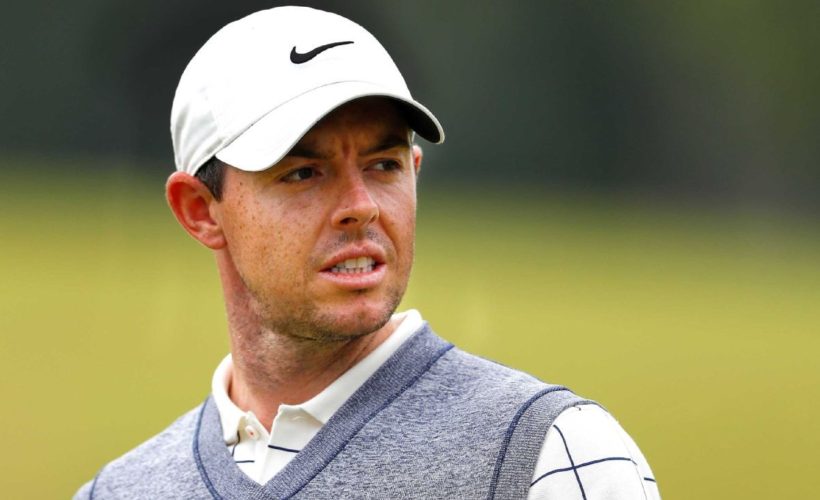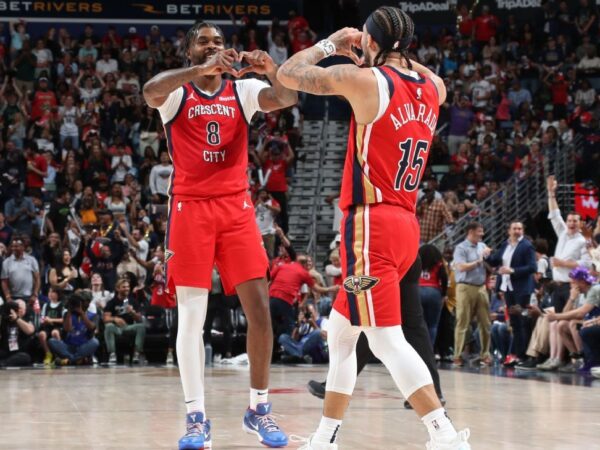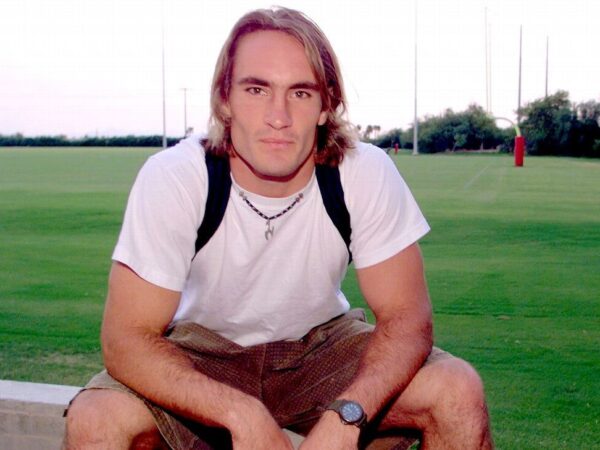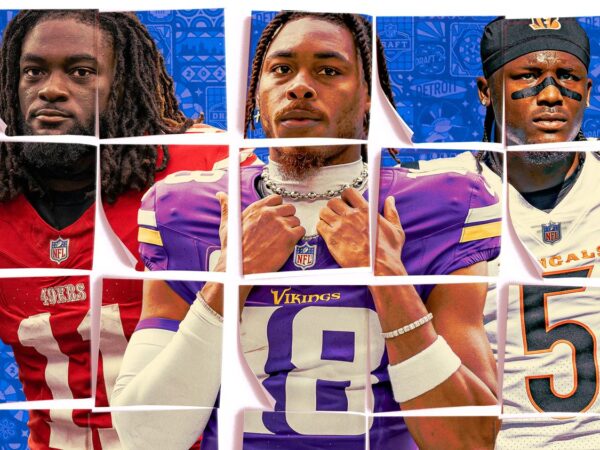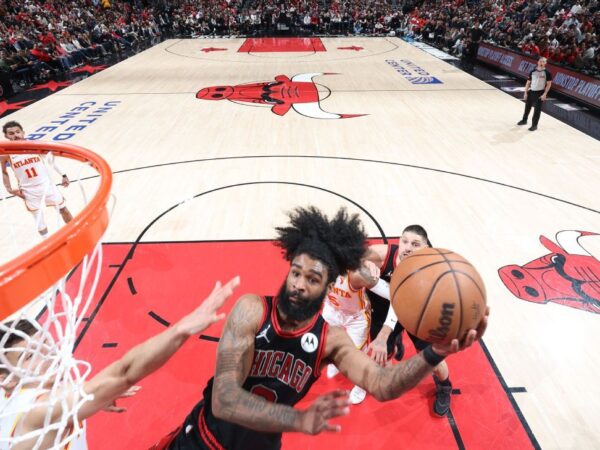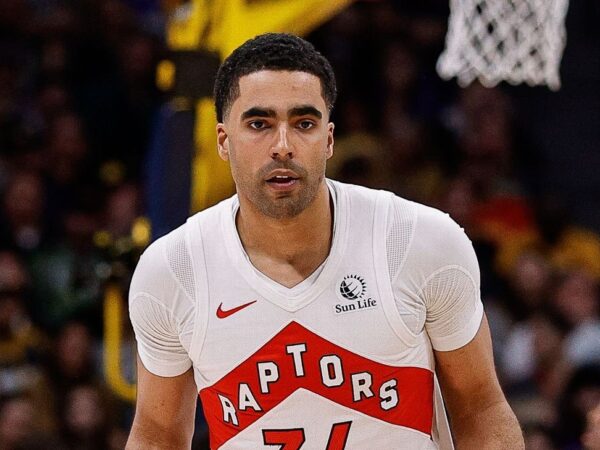BELFAST, Northern Ireland — To see the monstrous walls that separate Belfast’s people by political and religious beliefs is to understand that more than 20 years after the official end of the conflict known as the Troubles, Rory McIlroy‘s country remains a divided land.
The locals call these peace walls, but it is hard for a visitor not to think of war when standing next to them.
On a rare sunshiny morning in the capital of Northern Ireland, 60 miles south of Royal Portrush and the scene of the first version of The Open to be held in this nation in 68 years, children in a Protestant neighborhood played in a yard directly across from the Cupar Way barrier, 30 feet high, that prevents Catholic children from joining them. The dozens and dozens of peace walls, or peace lines, in and around a Belfast once battered and bloodied by three decades of sectarian fighting are a grotesque tangle of concrete, steel, metal, brick and barbed-wire fencing, and summon images of Cold War Berlin.
“End Sectarianism,” reads one painted plea from the Workers Party on Northumberland Street. “Bring down the walls.”
Until the walls come down — and there is no plan for their removal — the youth of Northern Ireland need role models who refuse to be defined by the beliefs or causes that segregate them.
This is why Rory McIlroy had already won his hometown Open before he even showed up this week to try to claim his fifth major title and first in five years.
As much as McIlroy was always driven to succeed his idol, Tiger Woods, as the world’s greatest golfer, he was committed to life as a global citizen and representative of all. Over the years, McIlroy has been pressed to pick sides publicly, to declare his allegiances, and despite his youth and his distaste for the subject, he has largely been dignified and thoughtful in his responses.
McIlroy, 30, has never allowed the game’s governing bodies — or the news media, or fans from Northern Ireland, the Republic of Ireland or England — to put him in a box. McIlroy did not want to be identified primarily as Catholic, or as Irish, or as British, or as someone who supported or opposed the Protestant majority in favor of keeping Northern Ireland part of the United Kingdom and against unification with the rest of the island.
He wanted to be identified as a champion who could, at least temporarily, help unite all of the above.
“Rory’s been a very good ambassador for the province,” said countryman David Feherty, the 60-year-old former pro and current Golf Channel host and NBC analyst who has long been close to McIlroy and his family.
Feherty said he has never needed to advise McIlroy on the persistent questions he fields about his identity because, “Rory really has had a great sense of how to handle that by himself.
“He’s such an approachable, affable and intelligent young man, and I think he gets both sides of the game from a media and athletic perspective. He’s living mostly in the United States now, but he’s still cognizant and very proud of where he’s from.”
McIlroy grew up in Holywood, a coastal village 5 miles outside of Belfast. Feherty, a self-described atheist raised in a Protestant family in Bangor, County Down, said he visited Northern Ireland’s capital about a month ago and felt the obvious tension that still exists between the unionist and loyalist Protestant majority and the republican and nationalist Catholic minority in support of a unified Ireland.
Feherty knows the feeling better than most. As a young man in Northern Ireland, he said, “It was like the TSA going into every store. Soldiers on the street and roadblocks and barriers. But there was very little actual violence in the town I grew up in. A couple of bombs and the occasional murder.”
Feherty would work at Balmoral Golf Club, where, he said, the clubhouse was blown up twice by terrorists. All these years later, Feherty said this of the peace walls: “It’s a necessary thing. You don’t want it there, but there’s still an undercurrent, and that hatred is passed down from father to son, mother to child. Hatred, you’re not born with. It’s a learned behavior. It’s ingrained to the extent that it’s really only education that can get us past it.”
In a different time and place in Belfast, that hatred impacted the McIlroy family in the most tragic way.
RORY McILROY, BORN NINE YEARS BEFORE the 1998 peace agreement in Northern Ireland, has said his Holywood youth was mostly untouched by the Troubles. But in 1972, Rory’s uncle on his father’s side, a computer technician named Joe McIlroy, was killed while his four young daughters slept upstairs in their Sandhill Drive home in the Orangefield area of East Belfast. McIlroy was fixing his washing machine when he was gunned down by two paramilitary members who hid in his garden and shot him multiple times through the back door.
“I put my arms around him and then I noticed my hands were covered in blood,” his wife, Mary, reportedly told investigators. “I ran screaming into the street.”
Detectives believe McIlroy was killed for having the nerve to move his Catholic family into a Protestant neighborhood. Though reports in June 2011 said that the Police Service of Northern Ireland had reopened the investigation into McIlroy’s unsolved murder, an ESPN.com request last week for an update on that investigation was met by this statement from Detective Chief Superintendent Bobby Singleton:
“The murder of Joseph McIlroy on 21 November 1972 was last reviewed by the Historical Enquiries Team (HET) who provided his family with their findings in March 2010. There are no current plans to re-open the investigation unless new information comes to light.”
Asked by ESPN.com to specify those findings, Gary Strain of the PSNI said, “Out of respect for the privacy of the families involved, we do not publicly discuss or comment on the specifics of individual cases or reports provided to families.”
Though he has known Rory McIlroy’s father, Gerry, for most of his life, Feherty said the murder of Gerry’s brother “is not something that ever came up.” As a family, the McIlroys were not about to be defined by an unforgivable act of violence.
Gerry and Rosie sent their only child to Sullivan Upper, an interdenominational grammar school. Rosie worked the night shift in a factory to help pay the bills as Rory chased his wildest golf dreams. Gerry worked in the Holywood bar and took on a second job in a rugby club, cleaning toilets and showers to make sure his son could afford to travel to the most important junior tournaments in the United States.
The sacrifices were all worth it. In 2010, two days before his 21st birthday, Rory claimed his first PGA Tour victory, at Quail Hollow. He was asked afterward if he considered himself more Irish or British.
“Pass,” he answered. “I’m Northern Irish, I hold a British passport, so there you go.”
The questions about his core identity — set against a centuries-old conflict over British rule in Ireland — were only beginning to pick up steam.
A year later, after McIlroy won the U.S. Open at Congressional, a fan was seen throwing the tricolor flag of the Republic onto his shoulders; when a TV camera found McIlroy moments later, the flag was gone, inspiring social media praise from Protestant fans who figured Rory had removed the flag, and anger from Catholic fans who figured the same. The next day, in an unrelated clash between Protestant and Catholic residents, three people were shot in Belfast.
“I know that 99.9 percent of the population doesn’t want to see that,” McIlroy said at the time. “Everyone just wants to live in peaceful times. I am aware that I’m going to be portrayed as a role model. I have to be very careful in what I say and do.”
In 2012, after McIlroy told the Daily Mail he always felt more British than Irish, he posted an open letter on Twitter denying that he had made a decision to play for Great Britain in the 2016 Olympics.
“I am in an extremely sensitive and difficult position,” McIlroy explained.
He wrote that he is a proud product of the Irish golf system, and of winning Golfing Union of Ireland teams.
“I am also a proud Ulsterman who grew up in Northern Ireland, which is part of the United Kingdom,” McIlroy said. “That is my background and always will be.”
McIlroy wrote of the support he had received from Irish, British and American fans.
“As an international sportsman,” he said, “I am very lucky to be supported by people all over the world, many of whom treat me as one of their own, no matter what their nationality, or indeed mine. This is the way sport should be.”
He was right, of course. McIlroy decided to compete for Ireland at the Rio Games in 2016, then ultimately cited concerns over the Zika virus in withdrawing. He later explained to The Independent, “I resent the Olympic Games because of the position it put me in. All of a sudden I had to question who I am. ‘Who am I? Where am I from? Where do my loyalties lie? Who am I going to play for? Who do I not want to piss off the most?'”
McIlroy said he had texted the English gold-medal winner, Justin Rose, that he didn’t feel a connection to the Irish or British anthems and flags.
“I don’t want it to be about flags,” McIlroy said. “I’ve tried to stay away from that. … Not everyone is [driven by] nationalism and patriotism, and that’s never been me, because I felt like I grew up in a place where I wasn’t allowed to be.”
Two months ago, at the PGA Championship at Bethpage Black, McIlroy said he would honor his development-system history and play for Ireland at the 2020 Olympics in Tokyo.
“It’s seen as a whole-island sport, just like hockey is, just like most of the sports are,” McIlroy said. “So then obviously when you put the Olympics into the equation and there’s a choice to be made, you really have to start thinking, ‘What are your beliefs and your values?’ And it makes you have to delve a little bit deeper. It’s not just a superficial decision. It’s something that you have to really believe in.”
More than anything, McIlroy seemed to believe in his power as a unifier through sport.
“Rory will never drive a wedge between us,” read one Belfast Telegraph headline in 2012. Too many people had driven too many wedges before him.
SECTARIAN VIOLENCE IS STILL A PART of life in Northern Ireland. During rioting in Derry in April, a journalist named Lyra McKee was shot dead by a paramilitary group, the New IRA, that was firing on police. Last month, police said terrorists tried to kill an officer by planting a bomb under his car.
“Violent Dissident Republicans have already demonstrated that they do not care who they hurt or who they kill nor do they listen to the overwhelming wishes of our communities — they are simply anti-peace and anti-democracy,” said Detective Superintendent Sean Wright.
One foreign statesman has the most direct intel on why these clashes continue. Long before he investigated performance-enhancing drugs in baseball, George Mitchell, the former Senate majority leader from Maine, confronted a far more significant human crisis: He was asked by President Bill Clinton to broker peace in Northern Ireland.
After Mitchell arrived as a special envoy in 1995, security officials told him his wife had to leave the country because the violence was too intense to guarantee her safety; Mitchell temporarily relocated her to London. The cease-fires declared by the Irish Republican Army and loyalist paramilitaries were imperfectly observed at best. Mitchell, who was initially supposed to remain in Northern Ireland for about six months, ended up chairing three separate sets of peace discussions over five years. He was an agent for staggering change who persuaded the governments of Great Britain, Ireland and almost all Northern Ireland political parties to reach a peace agreement on Good Friday in 1998. Four months later, dissident republicans opposed to the agreement set off a car bomb in Omagh that killed 29.
“It was a very deeply segregated society, and still is in many respects, with a heavy overlay of violence,” Mitchell, 85, recently told ESPN.com. “At the root of all these conflicts is mistrust, a tribal attitude that doesn’t trust in the other, whatever the tribe is, in this case between Protestants and Catholics. There was for many years harsh discrimination against the Catholic or nationalist minority, and that led inevitably to the violence. … It’s not just the number of deaths, 3,500 people killed during the Troubles. Not much attention is given to the tens of thousands who were permanently maimed through violence. You had kneecapping, where people were shot through the knees and ankles, and savage beatings that left people maimed for life. So indiscriminate was the violence, it created widespread fear.
“On the day [of the agreement], April 10, 1998, I said this was an historic agreement, which it was, because it brought an end to violence. But by itself the agreement did not guarantee peace, or reconciliations and stability. That would take change in people’s hearts and minds, and that is most difficult to achieve.
“People who most want those walls to remain are those who live there. You’ll be shocked when you see it. It is very close and dense, with these wire fences and houses on both sides, literally just feet apart.”
Today Mitchell isn’t eager to lecture another country on divisive domestic issues, not with political and racial turbulence dividing his own nation. But he is concerned that Brexit might restore a hard border between Northern Ireland and Ireland, which, he said, “could take attitudes back to the way people lived a hundred years ago.”
In the end, Mitchell is an optimist, a believer in the basic goodness of the island’s people. He returns to Northern Ireland several times a year, and sees a day when those peace walls in Belfast come down. As a golf fan who follows McIlroy and who has met Rory’s countryman and fellow major winner Graeme McDowell, Mitchell is happy The Open is back in their homeland for the first time since 1951. The American negotiator who helped pave the way for Northern Ireland to host this event said its most successful golfer, McIlroy, should not be pressured into declaring his loyalty to one country or cause.
“It’s difficult enough being a professional athlete in the public eye, particularly one of the best in the world, where everything you say or do is scrutinized,” Mitchell said. “So I understand and am sympathetic to the situation Rory finds himself in. I think people ought to let him handle it the way he wants, the way he has, without comment or criticism. … He looks to me like a terrific young man and a great athlete. He’s got his own life, and he ought not to be burdened by these things.”
IN THE LEAD-UP TO THIS HISTORIC EVENT at Royal Portrush, Darren Clarke, another major winner from Northern Ireland, spoke of a car bombing in 1986 that blew up the nightclub he worked in.
“That was life in Northern Ireland,” Clarke said. The Troubles kept the Royal & Ancient from seriously considering this country as the site of The Open for the longest time.
In today’s Belfast, murals of masked gunmen are still found on the walls among the messages of peace and hope drawn by artists and written by tourists. But the Good Friday Agreement, followed years later by the Clarke, McDowell and McIlroy victories, made this week possible.
“I think it’s the biggest sporting event the island has ever seen,” Feherty said.
Rory’s worldwide stardom added to the magnitude of the event. McIlroy has a combined 4.9 million followers on Twitter and Instagram; Northern Ireland has 1.87 million residents.
This is a good thing, too, given the way McIlroy has carried himself and managed an unmanageable issue. By example, he has shown young people in Northern Ireland that they can rise above the tribalism that built those Belfast walls in the first place.
Come Sunday, Rory McIlroy doesn’t need to kiss the Claret Jug and lift it toward the sky. He’s already won.
Source:ESPN

